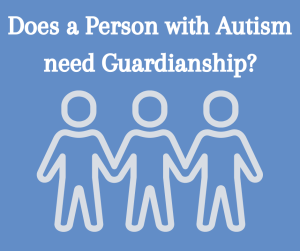 Some people with autism are fully capable of making their own decisions as active adults in the community. Others will require others to help with basic decisions for the rest of their lives. Then there many people with autism who fall somewhere in the middle.
Some people with autism are fully capable of making their own decisions as active adults in the community. Others will require others to help with basic decisions for the rest of their lives. Then there many people with autism who fall somewhere in the middle.
Guardianship is about decision-making. Can this person make his or her own decisions about where to live? Where to work? Can this person responsibly make medical decisions? Can he or she understand the obligations of a contract, such as a loan or an apartment lease? Can the person handle a bank account?
People with autism can demonstrate a wide range of abilities – sometimes even within the same person. One person with autism may ace mathematics quizzes but be unable to master a routine such as paying the electric bill every month. Another person may have extremely limited verbal skills but be able to reliably research symptoms on the Internet to type for the doctor, “I have a kidney problem”.
A special challenge for many people with autism is vulnerability to those who would take advantage of them. Difficulties in reading social expressions – both verbal and nonverbal – can make it hard to recognize a con artist, a person who is intentionally acting friendly to take advantage of a vulnerable person.
So how do you decide if a person with autism is going to need help with decision-making in adulthood? Best place to start is to ask the person! Be clear in discussing what “decision-making” really means. Give concrete examples. Invent some scenarios: “What would you do in this situation?”
Not every 18-year-old will automatically be able to handle every situation. Even neurotypical college students often call on Mom or Dad for advice from time to time. Key is whether the person learns from the experience. Will he or she be able to handle that sort of situation the next time, or will outside help always be needed?
Guardianship is a legal process. Through an attorney and the courts, specific decision-making rights of adulthood are removed from the person subject to guardianship and given, instead, to the guardian. The particular rights removed vary from state to state. In some states every person under guardianship gives up the same decision-making rights. In other states, the guardian and the court choose which rights are given up, and that list of rights may change from time to time depending on the ability of the person with a disability to make his or her own decisions.
An alternative to guardianship which is becoming more popular in the U.S. is called “supported-decision-making” (SDM). With SDM, the person with a disability retains his legal right to make decisions; however, he has one or more designated people to call upon when making decisions. The right to seek support on decisions is backed up by a form or legal document, but this is not generally filed or handled through the court system. An attorney may or may not be used, depending on the state.
There is no one right answer for everyone.
nonPareil Institute is a 501(c)(3) nonprofit with a mission of building better futures for adults with autism. For more information, visit www.npusa.org.